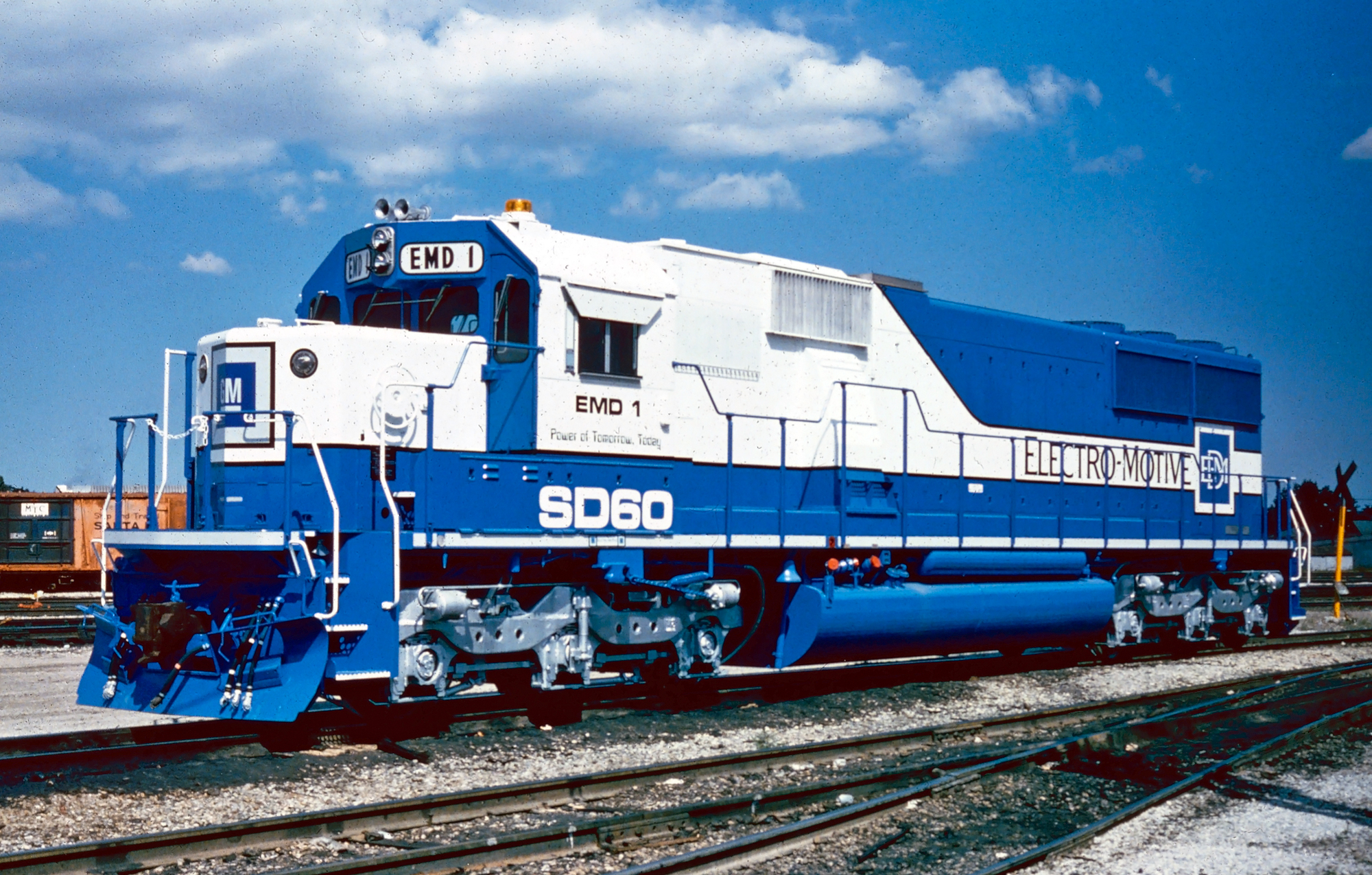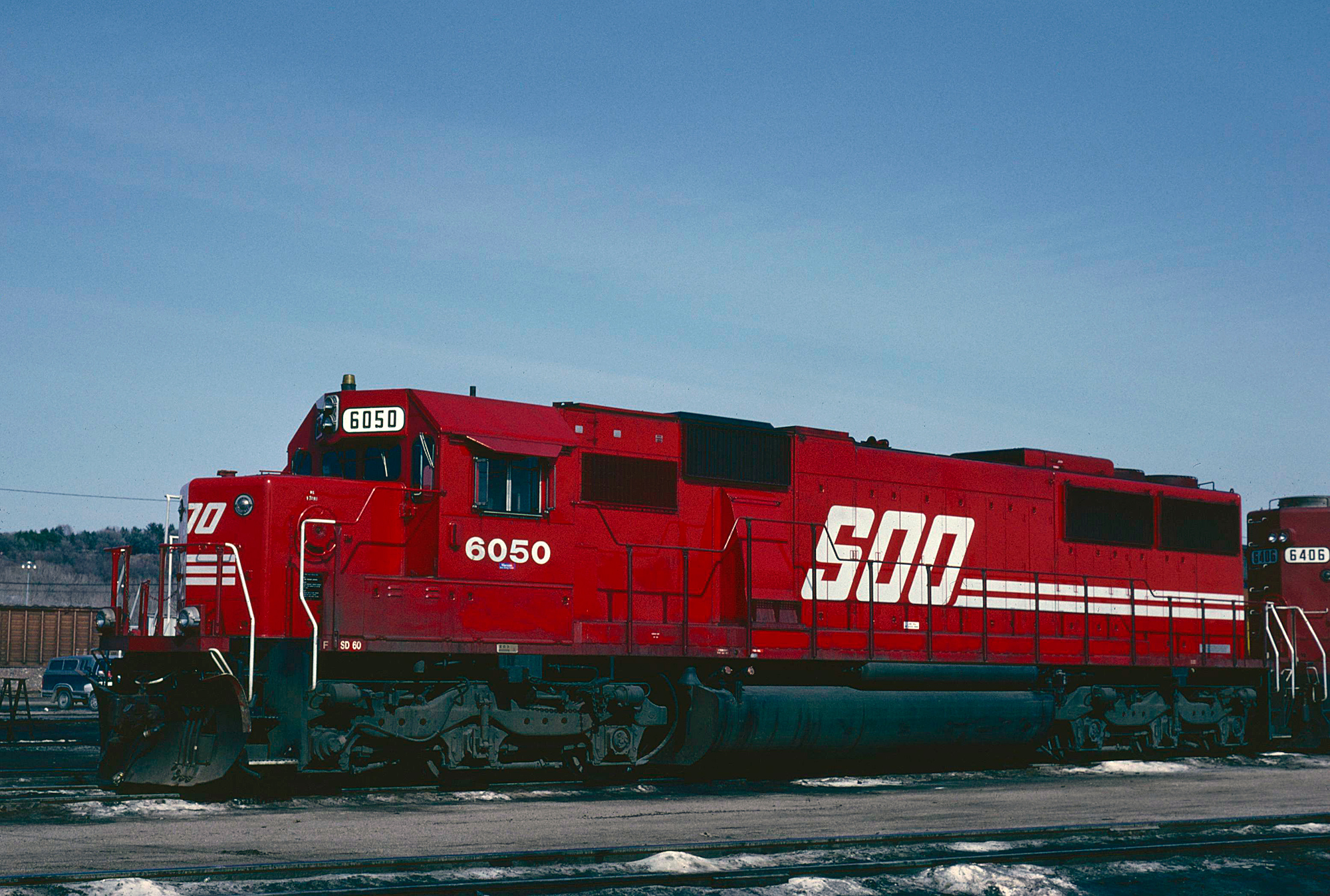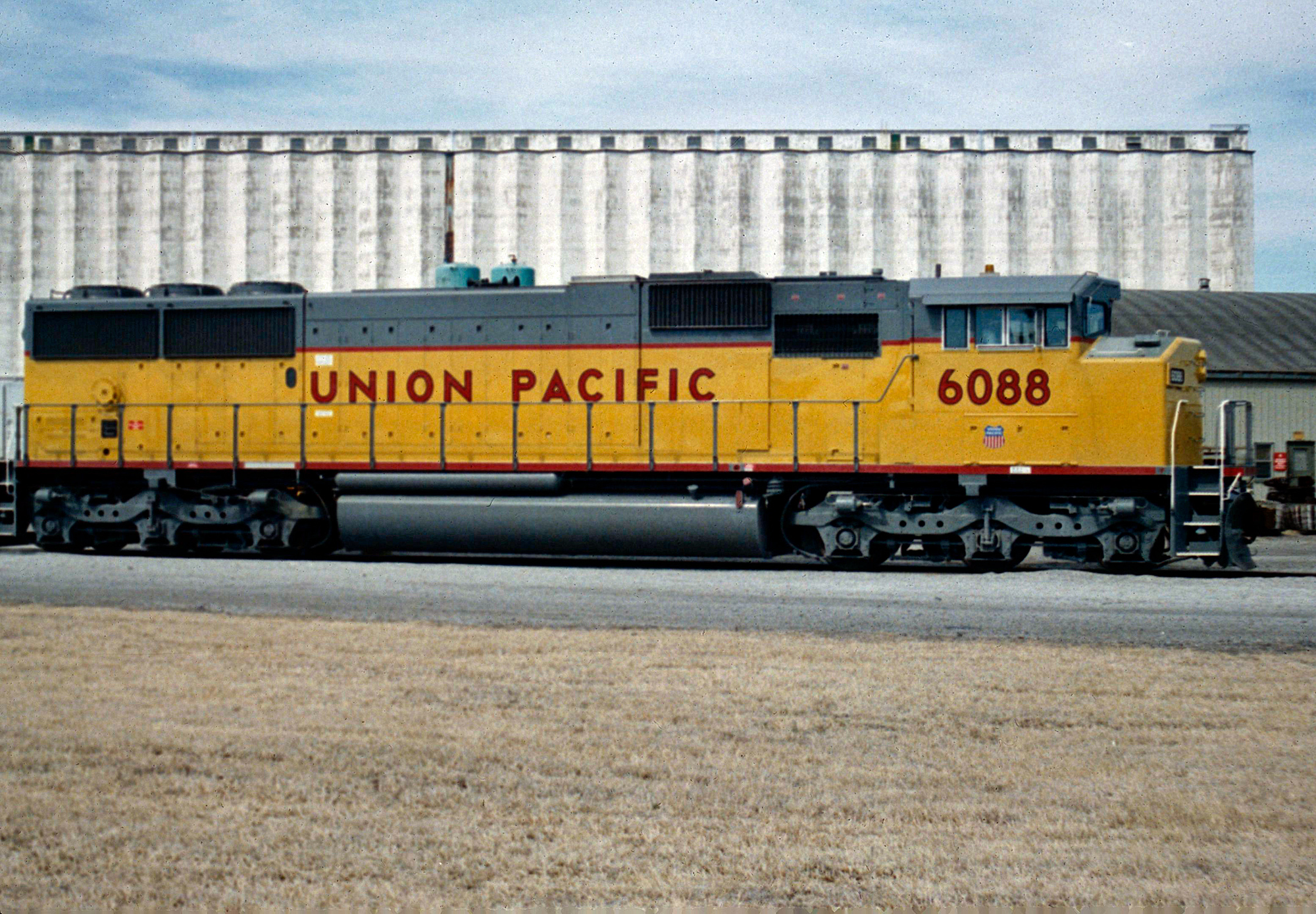EMD "SD60" Locomotives: Data Sheet, Specs, Roster
Last revised: December 18, 2024
By: Adam Burns
Debuting in the mid-1980s, the SD60 represented EMD's concerted effort to rectify the shortcomings of the SD50, which had been plagued by reliability issues and lackluster sales. While the SD60 bore a striking external resemblance to its predecessor, it boasted significant internal improvements, including an upgraded prime mover and modernized equipment.
Although the initial model achieved only modest sales figures, its various iterations proved far more successful, ultimately surpassing 1,000 units produced by the time production ceased in the mid-1990s. This resurgence proved pivotal for EMD, enabling the company to maintain its competitive edge against rival General Electric and, arguably, avert a near-total market share collapse.
The SD60's success paved the way for its successor, the SD70 series. While this new model did not fully restore EMD's dominance in the industry, it nonetheless proved to be a successful design, selling over 2,000 units and further solidifying EMD's position as a major player in the locomotive market.
Photos
 Seen here is Electro-Motive demonstrator EMD-1 in the summer of 1984. This unit became Conrail 6840. Mike Bledsoe photo. American-Rails.com collection.
Seen here is Electro-Motive demonstrator EMD-1 in the summer of 1984. This unit became Conrail 6840. Mike Bledsoe photo. American-Rails.com collection.Background
By the 1980s, La Grange's reputation for building dependable locomotives began to falter, and the SD50 played a significant role in this shift.
EMD, in a bold move, attempted to extract the same horsepower from its 16-cylinder, 645 engine as it did from the larger 20-cylinder, 645E3 power plant found in the SD45.
This ambitious approach, however, raised concerns within the industry. The SD50, as some feared, did encounter mechanical issues, a consequence of pushing the smaller engine to its absolute limits. Despite these challenges, the model managed to achieve a respectable sales figure of over 400 units during its abbreviated production run.
The SD60, which entered production in the spring of 1984, represented EMD's strategic response to the challenges posed by its predecessor.
Determined to deliver a more robust and reliable locomotive, EMD equipped the SD60 with its latest technological advancement: the 16-cylinder model 710G prime mover. This powerful engine boasted an impressive 3,800 horsepower, firmly positioning the SD60 as a heavy-haul and drag service powerhouse.
The SD60 featured GM's innovative D87B traction motor, delivering a remarkable 98,250 pounds of starting and 100,000 pounds of continuous tractive effort.
This represented a substantial increase over not only the troubled SD50 but also the venerable SD38 and SD40 series, which typically offered tractive effort ratings in the 80,000 to 90,000-pound range.
 Soo Line SD60 #6050 was photographed here by Jim Shepard at St. Paul, Minnesota on March 19, 1992. American-Rails.com collection.
Soo Line SD60 #6050 was photographed here by Jim Shepard at St. Paul, Minnesota on March 19, 1992. American-Rails.com collection.Despite being a significant improvement over the SD50 in terms of reliability and ease of maintenance, the original SD60 garnered only modest sales figures, particularly when compared to the competing offerings from General Electric at the time.
A mere 537 units were purchased by eight Class I railroads—Burlington Northern, CSX, Conrail, Chicago & North Western, Kansas City Southern, Norfolk Southern, Soo Line, and Union Pacific—along with a leasing firm (an additional four units were built directly by EMD). Canadian National also acquired 64 units featuring the distinctive "cowl" carbody, designated as SD60Fs.
These underwhelming sales numbers can likely be attributed to a lingering hesitancy within the industry towards EMD products following the widely publicized issues that plagued the SD50.
Ironically, the SD60 itself proved to be a mechanically sound and relatively low-maintenance locomotive. This inherent quality, however, would be more fully realized in the model's subsequent variants, which enjoyed significantly greater commercial success.
SD60M
The most successful variant was the SD60M; the "M" designated the model featuring the then-new wide "safety" cab that would eventually become standard across the industry.
Four Class Is purchased the SD60M including the Burlington Northern, Conrail, Soo, and Union Pacific. Among these four, 460 examples were produced between 1989-1993.
SD60I and SD60MAC
EMD also built an SD60I for Conrail, which purchased 81 units. The "I" designation stood for "isolated cab", also known as a whisper cab as it was meant to greatly reduce engine noise and vibrations for the crew by literally isolating the cab from the frame of the locomotive.
It should also be noted that EMD built four SD60MAC units (the "AC" referred to the model having alternating-current traction motors) as demonstrators for a new variant of the model.
While tested on the Burlington Northern, none were built, and the first AC model EMD released and ultimately cataloged was the SD70MAC.
Data Sheet and Specifications
| Entered Production | 5/1984 (Demonstrator #1) |
| Years Produced (SD60) | 5/1984 - 5/1991 |
| Years Produced (SD60M) | 1/1989 - 6/1993 |
| Years Produced (SD60I) | 4/1993 - 9/1995 |
| Years Produced (SD60MAC) | 6/1991 - 9/1992 |
| Engine | 710G |
| Engine Builder | GM |
| Horsepower | 3800 |
| RPM | 904 |
| Cylinders | 16 |
| Length | 71' 2" |
| Height (Top Of Rail To Top Of Cab) | 15' 7 ½" |
| Width | 10' 3" |
| Weight | 368,000 Lbs |
| Fuel Capacity | 3500 Gallons |
| Air Compressor | Gardner-Denver |
| Air Compressor Model | WBO |
| Air Brake Manufacturer | Westinghouse |
| Air Brake Schedule | 26L |
| Trucks | C-C |
| Truck Type | HT-C |
| Truck Wheelbase | 13' 7" |
| Wheel Size | 40" |
| Traction Motors | D87B (6), GM |
| Primary Generator | AR11, GM |
| Auxiliary Generator | Delco (A8102) |
| Alternator | GMD18 |
| MU (Multiple-Unit) | Yes |
| Dynamic Brakes | Yes |
| Gear Ratio | 77:17 |
| Tractive Effort (Starting) | 98,250 Lbs at 25% |
| Tractive Effort (Continuous) | 100,000 Lbs at 9.8 mph |
| Top Speed | 70 mph |
Production Rosters
SD60
Total Built = 537
| Owner | Road Number(s) | Serial Number(s) | Order Number | Completion Date |
|---|---|---|---|---|
| Electro-Motive (Demonstrators) | 1-4 (1, 2, 4 became Conrail #6840-6842) | 836054-1 thru 836054-4 | 836054 | 5/1984-7/1984 |
| Norfolk Southern | 6550-6553 | 836069-1 thru 836069-4 | 836069 | 12/1984 |
| Norfolk Southern | 6564-6603 | 847023-1 thru 847023-40 | 847023 | 7/1985-10/1985 |
| Union Pacific | 6000-6059 | 847028-1 thru 847028-60 | 847028 | 4/1986-6/1986 |
| Norfolk Southern | 6554-6563 | 847051-1 thru 847051-10 | 847051 | 6/1985-7/1985 |
| Burlington Northern | 8300-8302 | 847070-1 thru 847070-3 | 847070 | 11/1985 |
| Norfolk Southern | 6604-6628 | 857107-1 thru 857107-25 | 857107 | 2/1986-3/1986 |
| Norfolk Southern | 6629-6640 | 857124-1 thru 857124-12 | 857124 | 6/1986-8/1986 |
| Norfolk Southern | 6641-6650 | 857125-1 thru 857125-10 | 857125 | 8/1986 |
| Chicago & North Western | 8001-8055 | 867147-1 thru 867147-55 | 867147 | 8/1986-10/1986 |
| Oakway Inc. | 9000-9099 | 867150-1 thru 867150-100 | 867150 | 10/1986-12/1986 |
| Soo Line | 6000-6020 | 867164-1 thru 867164-21 | 867164 | 8/1987-11/1987 |
| Norfolk Southern | 6651-6665 | 877025-1 thru 877025-15 | C472 (built at GMDD) | 11/1988-12/1988 |
| Norfolk Southern | 6666-6675 | 877026-1 thru 877026-10 | C472 (built at GMDD) | 12/1988 |
| Union Pacific | 6060-6084 | 876030-1 thru 876030-25 | 876030 | 2/1988-6/1988 |
| Conrail | 6843-6867 | 886006-1 thru 886006-25 | 886006 | 8/1989-9/1989 |
| Kansas City Southern | 714-723 | 886014-1 thru 886014-10 | 886014 | 11/1989-12/1989 |
| Soo Line | 6042-6057 | 886019-1 thru 886019-16 | C485 (built at GMDD) | 10/1989-11/1989 |
| CSX Transportation | 8700-8709 | 886031-1 thru 886031-10 | 886031 | 10/1989-11/1989 |
| Soo Line | 6021-6041 | 897003-1 thru 897003-21 | C479 (built at GMDD) | 3/1989-4/1989 |
| Kansas City Southern | 724-735 | 896028-1 thru 896028-12 | 896028 (built at GMDD) | 11/1990-12/1990 |
| Norfolk Southern | 6676-6695 | 897056-1 thru 897056-20 | 897056 (built at GMDD) | 11/1990-12/1990 |
| Norfolk Southern | 6696 | 897057-1 | 897057 (built at GMDD) | 12/1990 |
| Kansas City Southern | 736-759 | 906114-1 thru 906114-24 | 906114 (built at GMDD) | 3/1991-4/1991 |
| Norfolk Southern | 6697-6700 | 907147-1 thru 907147-4 | 907147 (built at GMDD) | 5/1991 |
SD60M (Built at GMDD)
Total Built = 460
| Owner | Road Number(s) | Serial Number(s) | Order Number | Completion Date |
|---|---|---|---|---|
| Union Pacific | 6085-6109 | 886010-1 thru 886010-25 | C474 | 1/1989-2/1989 |
| Union Pacific | 6110-6159 | 886015-1 thru 886015-50 | C482 | 4/1989-5/1989 |
| Union Pacific | 6160-6209 | 886023-1 thru 886023-50 | C482 | 6/1989-7/1989 |
| Burlington Northern | 9200-9249 | 887033-1 thru 887033-50 | C491 | 12/1989-3/1990 |
| Union Pacific | 6210-6215 | 886036-1 thru 886036-6 | C482 | 6/1989 |
| Soo Line | 6058-6062 | 886055-1 thru 886055-5 | C494 | 11/1989 |
| Union Pacific | 6216-6267 | 886061-1 thru 886061-52 | C497 | 9/1990-11/1990 |
| Burlington Northern | 9250-9298, 1991 | 897049-1 thru 897049-50 | C493 | 1/1991-3/1991 |
| Union Pacific | 6268 | 896050-1 | 896050 | 12/1990 |
| Union Pacific | 6269-6315 | 906100-1 thru 906100-47 | 906100 | 11/1991-4/1992 |
| Conrail | 5500-5529 | 916246-1 thru 916246-30 | 916246 | 12/1992-2/1993 |
| Union Pacific | 6316-6365 | 926302-1 thru 926302-50 | 926302 | 8/1992-10/1992 |
| Conrail | 5530-5543 | 926330-1 thru 926330-14 | 926330 | 3/1993 |
| Conrail | 5545-5574 | 936400-1 thru 936400-30 | 936400 | 4/1993-6/1993 |
SD60I (Built at GMDD)
Total Built = 81
| Owner | Road Number(s) | Serial Number(s) | Completion Date |
|---|---|---|---|
| Conrail | 5544 | 926331-1 | 4/1993 |
| Conrail | 5575-5614 | 946506-1 thru 946506-40 | 12/1994-4/1995 |
| Conrail | 5615-5654 | 946530-1 thru 946530-40 | 3/1995-9/1995 |
SD60MAC
Total Built = 4
| Owner | Road Numbers | Serial Numbers | Completion Date |
|---|---|---|---|
| Burlington Northern | 9500-9501 | 896011-1 thru 896011-2 | 6/1991 |
| Burlington Northern | 9502-9503 (built by GMDD) | 906127-1 thru 906127-2 | 6/1992, 9/1992 |
General Motors Diesel Division (GMDD)
Total Built = 64
| Owner | Road Numbers | Serial Numbers | Completion Date | |
|---|---|---|---|---|
| Canadian National | 9900-9903 | A4468-A4471 | C448 | 8/1985-10/1985 |
| Canadian National | 5504-5523 | A4709-A4728 | C480 | 2/1989-3/1989 |
| Canadian National | 5524-5563 | A4761-A4800 | C480 | 8/1989-11/1989 |
 Union Pacific SD60M #6088 is seen here in February, 1990. Location not listed. American-Rails.com collection.
Union Pacific SD60M #6088 is seen here in February, 1990. Location not listed. American-Rails.com collection.It should be noted that there was another variant known as the SD60MAC. This model was essentially an SD60M that used alternating current (AC) traction motors and EMD constructed four that tested on Burlington Northern.
Today, while many original SD60s have been retired or rebuilt into newer models, a significant number remain in service. Their robust design and proven reliability have ensured their longevity, with some units logging millions of miles over their lifespan. Many railroads continue to utilize SD60s for mainline freight duties, while others have relegated them to secondary lines or local switching operations.
Sources
- Foster, Gerald. A Field Guide To Trains. New York: Houghton Mifflin, 1996.
- Marre, Louis A. and Pinkepank, Jerry A. Contemporary Diesel Spotter's Guide, The: A Comprehensive Reference Manual To Locomotives Since 1972. Milwaukee: Kalmbach Publishing Company, 1989.
- Marre, Louis A. Contemporary Diesel Spotter's Guide, The: A Comprehensive Reference Manual To Locomotives Since 1972, Including Rebuilding, Upgrading, And Leasing Programs (2nd Edition). Milwaukee: Kalmbach Publishing Company, 1995.
- McDonnell, Greg. Locomotives: The Modern Diesel & Electric Reference, 2nd Edition. Buffalo: Boston Mills Press/Firefly Books, 2015.
- Solomon, Brian. American Diesel Locomotive, The. Osceola: MBI Publishing, 2000.
- Solomon, Brian. EMD Locomotives. Minneapolis: MBI Publishing Company, 2006.
- Solomon, Brian. GE and EMD Locomotives: The Illustrated History. Minneapolis: Voyageur Press, 2014.
Recent Articles
-
Indiana Murder Mystery Dinner Train Rides
Jun 14, 25 08:53 AM
This piece explores the allure of murder mystery trains and why they are becoming a must-try experience for enthusiasts and casual travelers alike. -
Austin Steam Train Association
Jun 13, 25 07:58 PM
Nestled in the bustling city of Cedar Park, Texas, just a short drive from the vibrant cultural hub of Austin, lies a historical gem that takes visitors on a remarkable journey through time. -
Illinois Pizza Train Rides
Jun 13, 25 12:37 AM
For both residents and visitors looking to indulge in pizza while enjoying the state's picturesque landscapes, the concept of pizza train rides offers a uniquely delightful experience.


